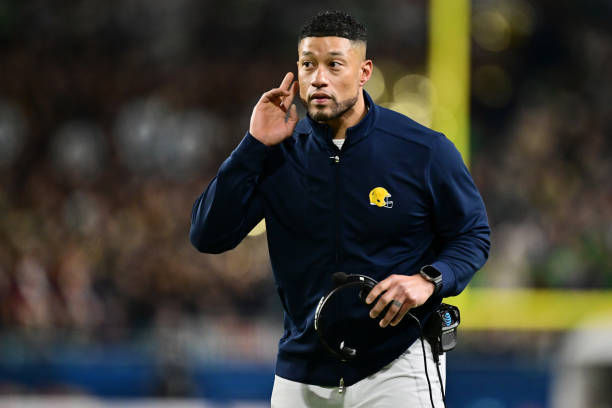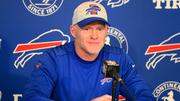

The college football landscape is currently tumultuous, much like a boiling pot at 100 degrees Celsius. On one hand, NCAA rulings regarding NIL have created division. Players are moving between teams on little notice, often in pursuit of a larger paycheck. Just consider Tennessee’s example. You make plans for the season around your quarterback, and woof! He’s gone. Many of these things happen behind closed doors. Add to that the recent House vs. NCAA settlement. It has introduced a significant change to college football by implementing full revenue sharing. However, Notre Dame’s athletic director has recently made a statement that could help ease some of the tension among the Irish football community.
Watch What’s Trending Now!
The settlement is meant to ruin the traditional scholarship cap, enabling the schools to pay directly. However, as a byproduct, it imposes a 105-roster limit on each of the FBS schools. So, what will be the future for the current players? A debate to chew over. The revision to the settlement, however, permits (not requires) schools to exempt current athletes from impending roster limits. However, the judge in charge of the case, Claudia Wilken, announced that she won’t pass the order unless and until any grandfather clause is introduced to safeguard athletes in danger of losing their roster spots. Finally, Notre Dame agreed to play the big man.
Notre Dame athletics director Pete Bevacqua told Yahoo Sports that the school will “honor the roster spot of all current athletes and permit those who were cut this year to return.” According to Ross Dellenger, this officially made them the first school to ‘grandfather in’ those who were affected or might be affected.
ADVERTISEMENT
Notre Dame AD Pete Bevacqua, long a proponent of phasing in roster limits, tells @YahooSports that the school will honor the roster spot of all current athletes and permit those who were cut this year to return, becoming first school to commit to fully grandfathering-in athletes.
— Ross Dellenger (@RossDellenger) May 8, 2025
The proposal will protect several walk-ons from the Irish camp. Currently, the roster limit, which includes summer enrollees, is set at 114. Bevacqua’s initiative would allow nine of the 21 walk-ons to remain with the program. Freeman, the innovative head coach, strongly supports keeping the walk-ons on the team. He has witnessed the value of these newcomers firsthand, as many of them have the potential to become future scholarship stars, consistently achieving milestone after milestone.
“I value walk-ons,” Freeman said during his Dec. 4 post-signing day conference. “I’ve said that before. What the walk-on process and those guys have done for our program has been tremendous. Their contributions to this current team have been invaluable.”
ADVERTISEMENT
Freeman and the Irish walk-ons-turned-scholarship players have long been manifesting the escape clause of the walk-ons restrictions.
ADVERTISEMENT
Marcus Freeman and the Irish put a lot of value on the walk-on tradition
Players who have experienced the ups and downs of the game felt extremely disappointed about the missed opportunities for walk-ons. Special teams coordinator Marty Biagi has elevated the walk-on program with remarkable skill. Players like Luke Talich have proven themselves worthy of scholarships. However, he worries that a similar success story could be difficult to achieve at Notre Dame if new regulations are implemented. A key aspect of the settlement includes allowing each school to share up to $20.5 million each year directly with their athletes, along with nearly $2.8 billion in back pay for players who have been unjustly denied the chance to earn money from their name, image, and likeness.
Talich said the decision might come to light in the NIL conundrum. But that’s not what the college football players are concerned about. Citing his own example, the athlete said it’s never been about money, nor should it be. Rather, it can distract the players and make them lose their skills and talent in a shuffle. The head coach doubled down.
Top Stories
Fired Sean McDermott Doesn’t Hold Back in Final Message to Bills Mafia As Locker Room ‘Sickened’ by HC’s Removal

Furious Terrell Owens Demands NFL Investigation on Refs for Decision That Eliminated Josh Allen & Bills

Mac Jones Issues Statement on Leaving 49ers Amid Backup QB’s Ongoing Trade Rumors

Bill Belichick Assigns Blame for Failures at UNC Amid Reports Linking HC to Top NFL Job

Naomi Osaka and Antonia Ruzic Refuse to Continue Australian Open Match- Here’s What Happened

CBS Announces Final Tony Romo Decision for AFC Championship Game Amid Health Struggles

“If you have to make some difficult decisions in terms of cutting your roster to 105, it’s going to be difficult. Because you care about every person in that room that has given everything they’ve got to Notre Dame,” Freeman said back in April. “But we also know that could be a possibility. We’ll wait until the settlement is finalized. I’m good with our plan.”
ADVERTISEMENT
However, the flexible scholarship plan and the latest grandfathering decision as the first school in the mix might mark the Irish safe from a lot of projected aftermaths of the rule.
ADVERTISEMENT
ADVERTISEMENT
ADVERTISEMENT